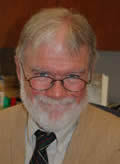
Although I share and indulge in it, I slightly mistrust intense affection for animals. Hitler loved his pets and wept inconsolably when a favorite canary died; Stalin was fond of more than a few dogs; and shortly before he calmly served up some 13,000 mostly teenage boys to the butchery that was the battle of Cold Harbor, Ulysses S. Grant felt such pity for a cruelly abused horse that he ordered the responsible army teamster tied to a tree for six hours. One needs to keep these things in perspective.
But I must confess, it’s still somewhat with me, that pang I felt a few mornings ago when I discovered that our old basset hound, Atticus, had died in his sleep the night before. For the previous week, he’d been fighting an infection he’d received from a tick bite, and the antibiotic the veterinarian had prescribed proved ineffectual. There are children in Haiti and Sudan who are right now dying for want of human antibiotics that would be highly effectual, I know, I know. And I also know that Atticus died much more peacefully than any of the children and old people who are victims of the floods to say nothing of the drone missile attacks in Pakistan. And I have attended the deathbeds of my parents and of other loved ones. I know all that, too. Still, one may be forgiven for mourning a dog.
In the numinous stories of the Japanese novelist Shusako Endo, there are occasionally arresting reverberations between the lives of dogs and the life of Christ. Endo was fascinated by, and wrote fascinatingly of, the ordeals of Japanese Catholics in the 17th century, when shogunal authorities required them to certify their apostasy by trampling and occasionally spitting on a fumie, an image of Christ.
“Even today, the moist, grieving eyes of dogs somehow remind me of the eyes of Christ,” Endo once wrote. “This Christ I speak of is, of course, not the Christ filled with assurance of his own way of life. . . . It is the weary Christ of the fumie, trampled upon by men and looking up at them from beneath their feet.”
Endo, a Catholic, knew that whatever is real is created by God, and whatever God creates, God can inhabit, fleetingly or forever. Because he was gifted (or perhaps afflicted) with a believer’s imagination, Endo could gaze into the eyes of a dog, or the eyes of a desecrated icon, and be gazed upon in return by the eyes of God made searingly incarnate.
A high-strung, excitable animal, Atticus was, as my daughter eulogized him on her Facebook page, “round and full of sound,” and I will not terribly miss his high-decibel and inexhaustible baying whenever a visitor crossed our threshold, nor will I miss the low-grade stench, peculiar to low slung hounds, that seemed to permeate any of the numerous household corners he chose for the slumber which filled his non-baying hours.
But I will certainly miss those moist and grieving eyes and what shone from them as I scratched his ears, as he wagged his tail and he looked at me, another gaze smuggled within his own. It is surely forgivable to miss such things.
But Atticus was, after all, only a dog, so within a week of his death, and with little fanfare another dog joined our household, a 5-year old mongrel bitch, or, as the kindly people at Pet Refuge prefer to describe her, a “spaniel mix” named Chloe. No less high-strung and excitable than Atticus, Chloe is somewhat more soft-spoken, and if she flies into paroxysms of emotion whenever the doorbell rings, she does so sotto voce. We’re grateful for that, and shower her with affection and praise.
Chloe, too, is only a dog, a decidedly cherished but nevertheless low-ranking presence in the family hierarchy. She is only a dog, but I’m grateful for this dog whose ears I will scratch affectionately when I go home from work this evening, whose sad eyes will remind me of other eyes, of eyes which can see all the world’s sadness, and of a Seer who longs to wipe every tear away.
Michael Garvey is Notre Dame’s assistant director of public information and communication. Email him at garvey.2@nd.edu.